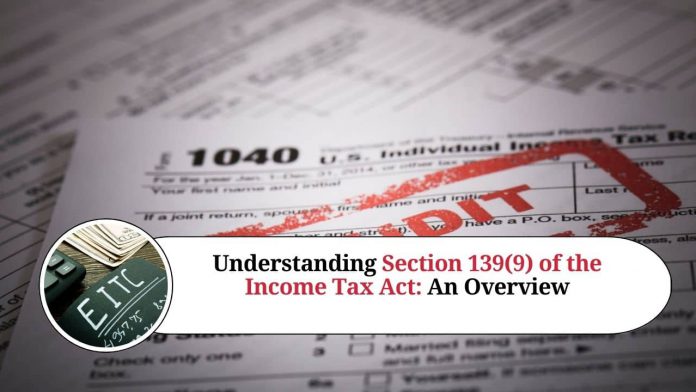The Income Tax Act is a comprehensive legislation that governs taxation in India. It contains various provisions related to the assessment, collection, and recovery of income tax. One such provision is Section 139(9) of the Income Tax Act, which deals with the rectification of mistakes in income tax returns filed by taxpayers. This article aims to provide an overview of Section 139(9) of the Income Tax Act and its significance for taxpayers.
Section 139(9) of the Income Tax Act:
Section 139(9) of the Income Tax Act states that if any person who has filed an income tax return discovers any mistake or omission in the return, he may rectify the same by filing a revised return. The revised return can be filed at any time before the expiry of one year from the end of the relevant assessment year or before the completion of the assessment, whichever is earlier.
The section further states that if the assessing officer finds any mistake or omission in the original return, he may rectify the same within the prescribed time limit. However, before making any rectification, the assessing officer must provide the taxpayer with an opportunity to be heard.
Significance of Section 139(9):
Section 139(9) of the Income Tax Act is significant for taxpayers as it provides them with an opportunity to correct any mistakes or omissions in their income tax returns. This can be particularly helpful in cases where the taxpayer has inadvertently left out certain income or claimed deductions or exemptions to which he is not entitled.
Rectifying such mistakes through a revised return can prevent the taxpayer from being penalized or facing legal consequences for filing an incorrect return. It can also help in avoiding unnecessary litigation with the tax authorities.
Moreover, rectifying mistakes in the original return can also help in minimizing the tax liability of the taxpayer. For example, if the taxpayer has inadvertently left out certain income in the original return, rectifying the mistake through a revised return can help in reducing his tax liability.
Procedure for filing a revised return:
To rectify any mistake or omission in the original return, the taxpayer must file a revised return. The revised return must contain all the details of the original return along with the changes made. The revised return can be filed either online or offline, depending on the taxpayer’s preference.
However, it is important to note that the revised return can only be filed before the expiry of one year from the end of the relevant assessment year or before the completion of the assessment, whichever is earlier. Therefore, taxpayers should review their income tax returns carefully before filing them to avoid the need for rectification at a later stage.
Final Conclusion:
Section 139(9) of the Income Tax Act provides taxpayers with an opportunity to rectify any mistakes or omissions in their income tax returns. This can help in avoiding legal consequences and minimize tax liability. However, taxpayers need to review their income tax returns carefully before filing them to avoid the need for rectification. Moreover, if a mistake is discovered, it is advisable to rectify it at the earliest to avoid any delays or complications in the assessment process.
Other Related Blogs: Section 144B Income Tax Act
Frequently Asked Questions:
Q:1 What is Section 139(9) of the Income Tax Act?
A: Section 139(9) of the Income Tax Act is a provision that allows taxpayers to rectify any mistakes or omissions in their income tax returns by filing a revised return.
Q:2 How can a taxpayer rectify mistakes in the income tax return?
A: The taxpayer can rectify mistakes in the income tax return by filing a revised return. The revised return must contain all the details of the original return along with the changes made.
Q:3 Can a taxpayer file a revised return for any assessment year?
A: A taxpayer can file a revised return for any assessment year, but only before the expiry of one year from the end of the relevant assessment year or before the completion of the assessment, whichever is earlier.
Q:4 Is there any penalty for rectifying mistakes through a revised return?
A: No, there is no penalty for rectifying mistakes through a revised return. Rectifying mistakes through a revised return can help in avoiding penalties or legal consequences for filing an incorrect return.
Q:5 Can the assessing officer rectify mistakes in the original return?
A: Yes, the assessing officer can rectify mistakes in the original return, but only within the prescribed time limit. Before making any rectification, the assessing officer must provide the taxpayer with an opportunity to be heard.
Q:6 Can rectifying mistakes in the original return help in minimizing tax liability?
A: Yes, rectifying mistakes in the original return can help in minimizing tax liability. For example, if the taxpayer has inadvertently left out certain income in the original return, rectifying the mistake through a revised return can help in reducing his tax liability.
Q:7 Can a revised return be filed offline?
A: Yes, a revised return can be filed either online or offline, depending on the taxpayer’s preference.
Q:8 Is it advisable to review the income tax return before filing it?
A: Yes, it is advisable to review the income tax return carefully before filing it to avoid the need for rectification at a later stage.




















